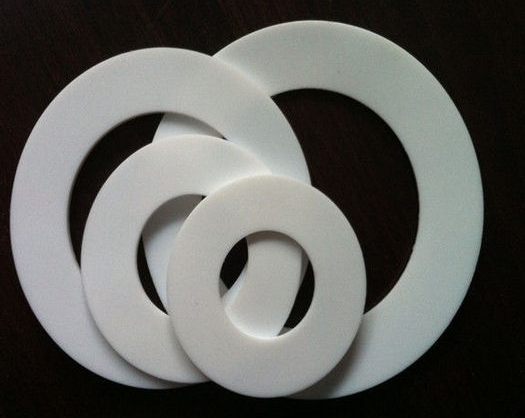- 13
- Nov
Junta de PTFE
Junta de PTFE
PTFE gaskets have excellent properties of creep resistance, cold flow resistance, ultra-low temperature resistance, no pollution, and easy installation and disassembly. Under a small pre-tightening force, it can withstand considerable internal pressure even in a pressure fluctuation environment. It is very suitable for rough or unevenly worn and fragile glass-faced flanges and temperature-changing sealing occasions. We can choose Gore, Klinger, Garlock, Sealon and other expanded PTFE sheets for customers to produce the required gaskets for customers.
vantagem
Resistência a altas temperaturas – a temperatura de trabalho pode chegar a 250 ℃.
Resistência a baixas temperaturas – tem boa tenacidade mecânica; mesmo se a temperatura cair para -196 ℃, ele pode manter o alongamento de 5%.
Resistência à corrosão – é inerte à maioria dos produtos químicos e solventes e pode suportar ácidos e álcalis fortes, água e vários solventes orgânicos.
Weather resistance-has excellent aging life in plastics.
High lubrication-is the low coefficient of friction in solid materials.
Non-adhesion-it means that the surface tension in the solid material is small and does not adhere to any substance. Its mechanical properties have a very small friction coefficient, which is only 1/5 of that of polyethylene. This is an important feature of the perfluorocarbon surface. In addition, because the fluorine-carbon chain intermolecular forces are extremely low, PTFE is non-sticky.
Non-toxic and harmful-with physiological inertia, as an artificial blood vessel and organ implanted in the body for a long time without adverse reactions.
Propriedades elétricas O politetrafluoroetileno tem baixa constante dielétrica e perda dielétrica em uma ampla faixa de frequência, e tem alta tensão de ruptura, resistividade de volume e resistência de arco.
Radiation resistance Polytetrafluoroethylene has poor radiation resistance (104 rad), and it degrades after being exposed to high-energy radiation, and the electrical and mechanical properties of the polymer are significantly reduced. Application Polytetrafluoroethylene can be formed by compression or extrusion processing; it can also be made into water dispersion for coating, dipping or making fibers. PTFE is widely used as high and low temperature resistant, corrosion resistant materials, insulating materials, anti-stick coatings, etc. in nuclear energy, aerospace, electronics, electrical, chemical, machinery, instruments, meters, construction, textiles, food and other industries.
Resistência ao envelhecimento atmosférico: resistência à radiação e baixa permeabilidade: exposição de longo prazo à atmosfera, a superfície e o desempenho permanecem inalterados.
Não combustibilidade: O índice limite de oxigênio é inferior a 90.
Resistência a ácidos e álcalis: insolúvel em ácidos fortes, álcalis fortes e solventes orgânicos.
Resistência à oxidação: resistente à corrosão por oxidantes fortes.
Acidez: Neutro.
As propriedades mecânicas do PTFE são relativamente suaves. Tem uma energia superficial muito baixa.
Polytetrafluoroethylene (F4, PTFE) has a series of excellent performance: high temperature resistance-long-term use temperature of 200~260 degrees, low temperature resistance-still soft at -100 degrees; corrosion resistance-resistance to aqua regia and all organic solvents; Weather resistance-aging life in plastics; high lubrication-with a small coefficient of friction (0.04) in plastics; non-stickiness-with low surface tension in solid materials without adhesion of any substances; non-toxic-with physiological inertness; excellent electrical properties , Is an ideal C-level insulating material.

